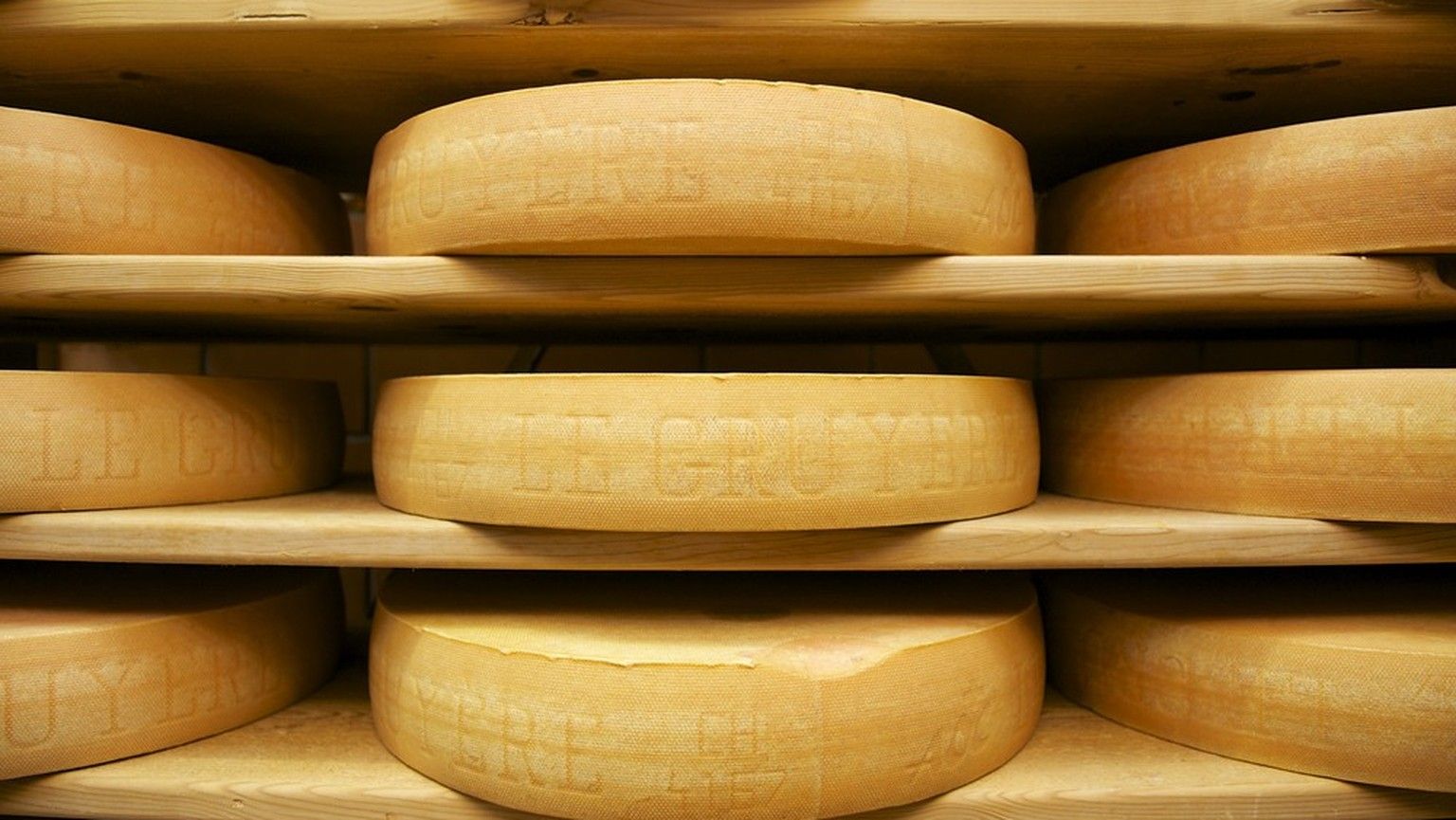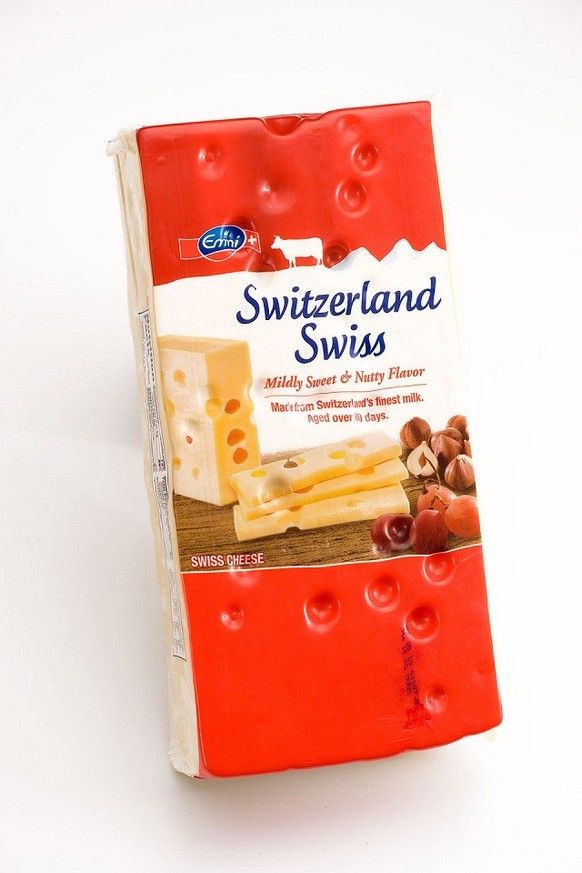The Gruyère, the Head of the monk or the Emmental seduce in the United States. But the policy of the American president is likely to undermine constantly increasing exports.
01.05.2025, 05:3801.05.2025, 05:38
Maurizio Minetti / CH Media
Swiss cheese is experiencing international success. Approximately 40% of Swiss production is exported, This towards more than 70 countries. The main buyers are Germany and Italy, followed by the United States. According to Switzerland Cheese Marketing, last year, 8,774 tonnes of Swiss cheese were exported to the United States, for a value of 114 million francs. This corresponds to 11.1% in quantity and 15.3% in value of total exports of Swiss cheese.

Gruyère wheels being refined. Image: Shutterstock
This is why, since the blow of the customs duties of Donald Trump in early April, the branch is feverish. Swiss products imported into the United States should have been subject to customs duties of 31%, against 10% currently. In mid-April, at the assembly of delegates of the cooperative of milk producers from Central Switzerland (ZMP), its director Pirmin Furrer stressed that The export of cheese is “of systemic importance” for Swiss dairy production.
For the entire sector, the problem of customs duties arrives at the wrong time. In 2024, after two years of decline, exports of Swiss cheese had again increased slightly. The country has thus exported 79,268 tonnes of Swiss cheese, for a value of 748.5 million francs, an increase of 7.9% in the space of one year.
This is even the second best year of export since the start of the surveys, said Switzerland Cheese Marketing at the end of January. On the American market, exports increased by 1.4% last year. A few weeks ago, the potential for the sale of our cheese in the United States was considered enormous. Because the average price paid by Americans for Swiss gummies is also much higher than that paid for example by the Germans.
The great fear of hindsight
This is why, in recent years, certain specific ridges have developed their activities in the United States. For the director of the Association of AOP Moine Head producers, Martin Siegenthaler, it would be mess:
“It would of course be a shame that the amount of cheese sold in the United States is decreasing. We have invested in this market in recent years, and have been able to increase the quantities exported. ”
At Appenzeller, we say the same. Reto Steiger, marketing chief of the organization which represents this product, explains:
“We are still developing the market in the United States, and we still have relatively little to lose. But we maintain our decision to develop the American market, because it is essential to better distribute the cyclical or regional risks in the long term. ”
With an export volume to the United States of only about 100 tonnes, the Appenzeller is thus significantly less exposed than others to American customs policy.
It is for the Gruyère that it heats
In the United States, Gruyère is very exposed to these issues. With exactly 4,341 tonnes, PDO cheese represents half of Swiss cheese exports in the USA, while The American market represents a third of all Gruyère exports. In second position of American exports, we find the cheap version of the Emmental, the Switzerland Swisswith 2724 tonnes delivered to the United States. As for the Emmental AOP, which occupies third place in exports, 400 tonnes were imported into America.

dr
Why is Gruyère so popular in the United States? “Because it’s the best cheese!” Says Philippe Bardet, director of the AOP Gruyère interprofession. This popularity would be linked to the fact that the taste of the Gruyère is clearly distinguished from that of local cheese. However, the Gruyère is not number one in the United States for a very long time. At the turn of the millennium, the Emmental AOP was even more popular. At the time, only 2,000 tonnes of Gruyère AOP per year left for the United States, about half of what they represent today. Philippe Bardet summarizes it as follows:
“We have invested a lot in recent years”
Asked about customs duties, Philippe Bardet affirms that the situation first provokes a great uncertainty in the trade:
“The intermediaries order less or wait, because they do not know what will happen”
But the director is nevertheless confident. The Gruyère is positioned in the premium segment, where customers are less sensitive to price fluctuations.
“We can imagine price increases, if necessary, for American target consumers”
Prices are the business of Swiss manufacturers, like Emmi. The interprofession has no direct power in this area. It decides on the amount paid to milk producers, cheese makers as well as other subcontractors. On this subject, Philippe Bardet is clear:
“We will not reduce the prices we pay to suppliers”
The impact is very real
Questioned on this subject, Emmi confirms that “the new customs situation essentially concerns cheese specialties exported from Switzerland, such as Gruyère AOP”, whose protected origin is a guarantee of quality. But concerning the situation in the United States, the spokesperson for the first dairy manufacturer in Switzerland, Simone Burgener, explains that Emmi applies a decentralized business model, that is to say that it produces “locally for the local market”.
Emmi has been present in the United States since 2008:
“Like Switzerland, the United States are part of our four strategic markets. Some 85% of our American turnover is produced locally. Currently, we employ more than 1,200 people on our sites in the states of Wisconsin, New York, New Jersey and California. Over the past ten years, we have invested substantially in the American site and created jobs. ”
Simone Burgener, doors-parts of Emmi
She also specifies that “like other companies, we will have to pass on the current increase in customs duties on our American customers”.
The low dollar does not help
The Dollar price is a big problem for exports. Philippe Bardet confirms it:
“I remember when the US dollar was at 2.30 francs in the 1980s. It is today at 80 cents, which is obviously catastrophic for export”.
The weakness of the dollar also has a direct influence on the price of Swiss B milk, since it is indexed to the dollar. This milk is used for dairy products with limited added value, such as powders.
A decrease in the Dollar price therefore leads to a drop in price. Swiss dairy production is therefore already directly affected by the US customs and commercial policy. No matter, therefore, what will happen after the expiration of the 90 -day truce.
Other players also point out that with higher import duties, prices for foreign products will increase overall in the United States. This strengthens inflationary pressure, and decreases the purchasing power of American consumers:
“This results in a double negative effect for exports of Swiss cheese. Higher prices, on the one hand, and a potential drop in demand on the other hand. ”
Switzerland Cheese Marketing.
And Emmi’s spokesperson concludes:
“The customs situation may weigh even more on the consumption climate and demand in the United States, which has been undermined.”
Translated from German by Joel Espi










